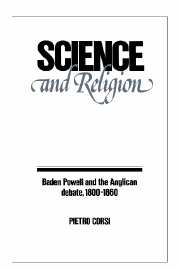10 - Science and revelation: 1826–1836
Published online by Cambridge University Press: 15 December 2009
Summary
The decade from 1826 represented a period of deep intellectual and political re-orientation in the Anglican Church. The process of revision to which Baden Powell submitted his theological and political ideas also modified his early convictions on the subject of the relationship between science and religion. As we remarked when examining Baden Powell's early contribution to the science–religion debate, few of the certainties of the 1820s survived the political and intellectual storm of the late 1820s and the early 1830s.
The belief that modern geology triumphantly established the historical truth of the Mosaic deluge was found to be groundless. The conviction that it was always possible to point out elements of coincidence between geological discoveries and the word of scripture was progressively shaken by the outcome of geological debates. Leading British geologists abandoned important features of the diluvial doctrine and questioned the assumption that the earth's chronology as established by geology proved the literal truth of the Genesis account of creation.
Baden Powell became aware that his former hints concerning the antecedent moral corruption of those who opposed scientific findings to the scriptures could hardly apply to Buckland, John Fleming, George Poulett Scrope (1797–1876) or Sedgwick. He was also faced with the problem of repeated attacks by leading Anglican divines and members of the Hackney Phalanx against the alleged Christian unworthiness of scientific pursuits. Baden Powell made every effort to counteract a trend towards confrontation which hampered his endeavours at introducing scientific disciplines into the Oxford curriculum. Thus, when Rose published his Commencement Sermon lamenting the undue pre-eminence accorded to mathematical studies at Cambridge, Baden Powell wrote a conciliatory but firm letter to the Christian Remembrancer, denying Rose's allegations.
- Type
- Chapter
- Information
- Science and ReligionBaden Powell and the Anglican Debate, 1800–1860, pp. 124 - 140Publisher: Cambridge University PressPrint publication year: 1988



